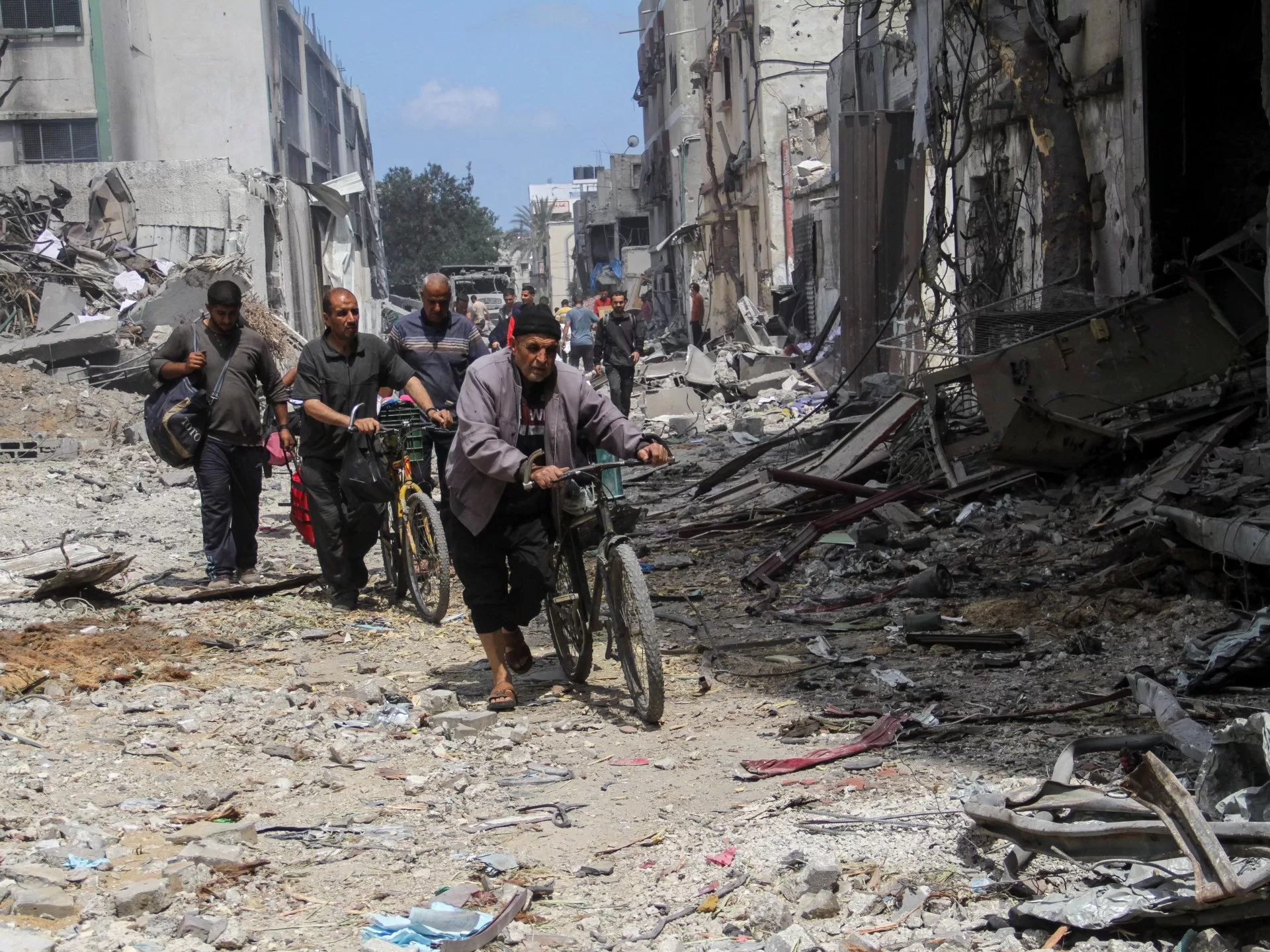In the northern Jabalia district, now widely destroyed, residents said Israeli tanks had destroyed clusters of homes but were facing heavy resistance from fighters with the Palestinian group Hamas, which governs Gaza and the Palestinian Islamic Jihad (PIJ) armed group on Wednesday.
“They are bombing houses on top of their inhabitants,” said Abu Jehad.
The PIJ claimed it killed some Israeli soldiers in Jabalia, while Israel’s military said it eliminated many fighters in the area.
Israel sent troops back into areas in northern Gaza earlier this week after claiming they had defeated Hamas there months ago.
Israel’s military ordered more evacuations from the al-Manshiya and Sheikh Zayyed neighbourhoods in northern Gaza. The United Nations estimated that some 100,000 people have been forcibly expelled from the north in recent days.
In Gaza City, several people were killed after Israeli forces struck a group of Palestinians at the intersection of Jalaa Street and al-Oyoun Street, the official Palestinian Wafa news agency reported.
At least three bodies arrived at al-Ahli Arab Hospital in Gaza City, as well as a number of critical cases, Wafa said.
The number of dead from this attack, which targeted a gathering point for internet access, is expected to rise, according to Al Jazeera’s Hani Mahmoud.
“This is not the first time we see this pattern of attacks on civilians gathering in large groups, either at a food distribution or internet connection points, or even at a solar-powered point to charge their phones or computers,” Mahmoud said.
Palestinian health officials said at least 82 Palestinians were killed in the previous 24 hours.
‘Vengeful’ attacks
Hamas decried attacks against civilians across the Strip, saying they are “fascist and vengeful” acts that reflect the Israeli army’s state of “defeat”.
In Rafah, Israeli tanks have been massed around the eastern edges of Rafah and in recent days, have been probing into built-up areas of the city, where hundreds of thousands of displaced people have sought shelter from bombardment elsewhere in Gaza.
Residents said Israeli forces had pushed into three neighbourhoods and Palestinian fighters were trying to prevent soldiers and tanks moving towards the centre.
Aid groups including the International Rescue Committee (IRC) warned they are facing significant disruptions in their humanitarian operations as the Israeli army moves into the city to conduct its widely criticised ground offensive.
“I have recently returned from Gaza, where the scale of the crisis defies imagination. Facilities across southern Gaza have been repurposed into makeshift shelters overflowing into the streets,” Kiryn Lanning, IRC team lead for the occupied Palestinian territory, said.
“This displaced population is now facing acute shortages of basic necessities such as food, water, and adequate sanitation,” Lanning added.
Last week, after the Israeli army seized and shut down the Palestinian side of the Rafah border crossing between the Gaza Strip and Egypt – a vital entry point for humanitarian aid – the UN’s agency for Palestinian refugees, UNRWA, warned that southern Gaza’s hospitals had only days of fuel left to run their operations, and that the entry of fuel into the Strip was essential to prevent more deaths.
Sporadic aid deliveries into Gaza by truck have slowed to a trickle since Israeli forces took control of the Gaza side of the crossing on May 7.
A convoy carrying humanitarian relief goods was ransacked by far-right Israelis on Monday after it had crossed from Jordan through the occupied West Bank.
Israeli Prime Minister Benjamin Netanyahu has claimed there is “no humanitarian catastrophe” in Rafah, where about 450,000 people have been driven out of their places of shelter since last week, according to the UN.
As the fighting intensifies, ceasefire talks mediated by Qatar and Egypt have hit an impasse, with Hamas demanding a permanent end to attacks and Netanyahu’s government saying it will not stop until the group is annihilated.
US Secretary of State Antony Blinken urged Israel to produce a clear plan for Gaza’s post-war future.
Netanyahu has opposed the creation of an independent Palestinian state, which most foreign powers see as the only long-term solution.
He said that any move to establish an alternative to Hamas as the government of Gaza required that the Palestinian group first be eliminated, and demanded this goal be pursued “without excuses”.
His remarks, in a video statement posted online, followed a public challenge by Defence Minister Yoav Gallant, who accused the government of having avoided a serious discussion of a proposal for a non-Hamas post-war Palestinian administration.
Hamas chief Ismail Haniyeh has reiterated that the group rejects any post war settlement that does not include Hamas.
“We are here to stay”, Haniyeh said in a statement late on Wednesday, adding that the group is sticking to its demands of a permanent ceasefire in Gaza.
